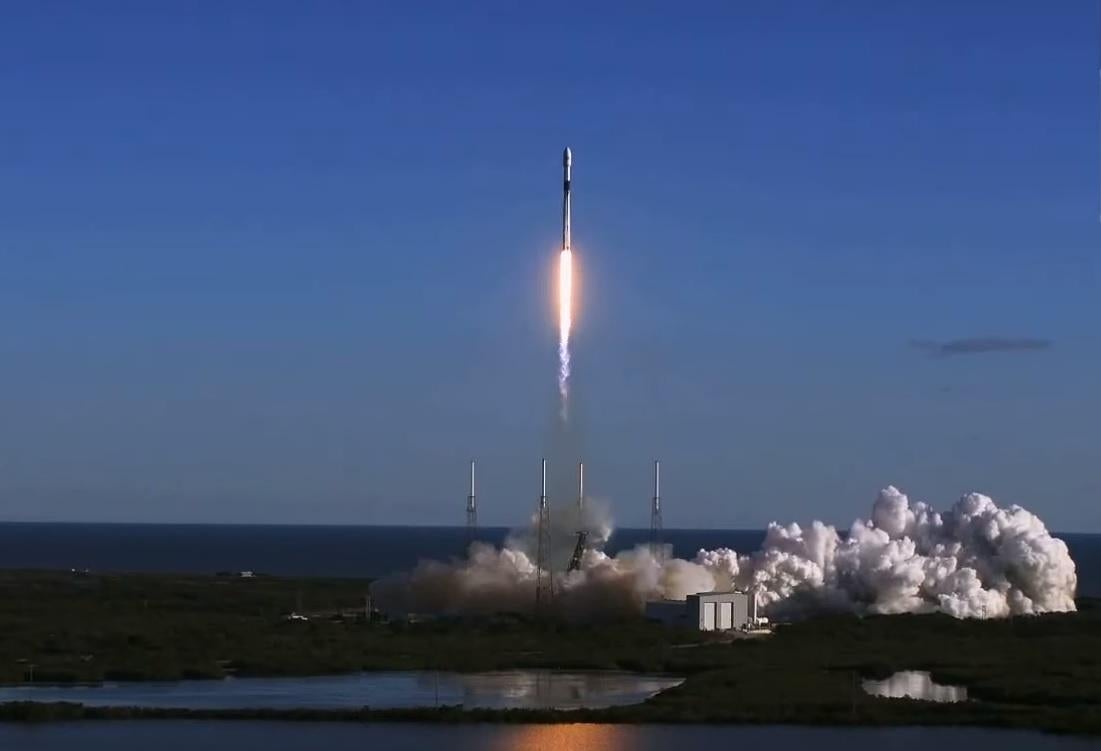SpaceX rocket finally launches first spy satellite into space after series of setbacks
Elon Musk's private space firm fulfilled its first military contract
Your support helps us to tell the story
From reproductive rights to climate change to Big Tech, The Independent is on the ground when the story is developing. Whether it's investigating the financials of Elon Musk's pro-Trump PAC or producing our latest documentary, 'The A Word', which shines a light on the American women fighting for reproductive rights, we know how important it is to parse out the facts from the messaging.
At such a critical moment in US history, we need reporters on the ground. Your donation allows us to keep sending journalists to speak to both sides of the story.
The Independent is trusted by Americans across the entire political spectrum. And unlike many other quality news outlets, we choose not to lock Americans out of our reporting and analysis with paywalls. We believe quality journalism should be available to everyone, paid for by those who can afford it.
Your support makes all the difference.SpaceX has launched a next-generation GPS satellite for the US Air Force after almost a week of delays for its Falcon 9 rocket.
The launch was originally scheduled for 18 December in Cape Canaveral, Florida, but weather conditions and technical issues forced the launch to be postponed four times.
It is the first time Elon Musk's private space firm has launched a satellite for the US military as part of an $83m (£65m) contract with the air force.
The lucrative military satellite market was previously dominated by Boeing and Lockheed Martin. However, SpaceX successfully brought a lawsuit in 2014 to open it up.
The spy satellite – nicknamed Vespucci, after Italian explorer Amerigo Vespucci – will join the air force's current constellation of 31 operational GPS satellites.
"Launch is always a monumental event, and especially so since this is the first GPS satellite of its generation launched on SpaceX's first national security space mission," said air force spokesman Lieutenant General John Thompson.
"As more GPS III satellites join the constellation, it will bring better service at a lower cost to a technology that is now fully woven into the fabric of any modern civilisation."
Colonel Robert Bongiovi, launch enterprise director, added: “The first GPS III launch marks a significant milestone for the GPS constellation as well as our partnership with SpaceX. This launch demonstrated the successful teamwork and cooperation amongst all mission partners to deliver the capabilities our warfighter demands.”
SpaceX described the capabilities of its payload in its mission overview, noting the launch is "critical to national defence".

The space firm said: "The newest generation of GPS satellites is designed and built to deliver positioning, navigation, and timing information with three times better accuracy, and up to eight times improved anti-jamming capability."
Unlike recent SpaceX missions, no attempt was made to land the first stage of the rocket, despite Air Force officials initially hinting the launch might include a landing.
SpaceX will launch a minimum of four subsequent GPS satellites as part of its contract with the air force.

Join our commenting forum
Join thought-provoking conversations, follow other Independent readers and see their replies
Comments